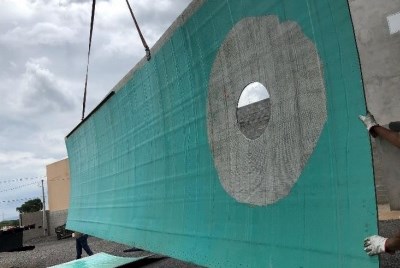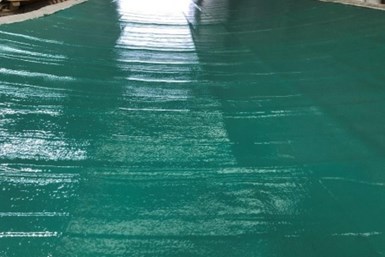FCI-Marbocote develops anti-corrosion coating suitable for contact with drinking water
Ycon CS Acqua coating is characterized by high levels of resistance adhesion and elasticity, and is ideal for protection of composite substrates, amongst other materials.

Assembly of Vantare tank coated with Ycon CS Acqua. This image depicts a composites plate with manhole. All photo credit: Vantare.
FCI-Marbocote (São Paulo, Brazil), a company that specializes in the manufacture of mold release agents and anti-corrosion products, has launched its own coating for tanks that store drinking water. Named Ycon CS Acqua, the product was developed at the request of Vantare, a manufacturer of modular composite tanks. (CW covers composite covers that protect water storage in Bogotá, Colombia).
Renato Ferrara, technical manager of FCI-Marbocote, explains that Ycon CS Acqua received the Innocuity Report, as required by Consolidation Ordinance No. 5, from the Brazilian Ministry of Health. “The tests were conducted by Newtech, a laboratory accredited by INMETRO [The National Institute of Metrology, Standardization and Industrial Quality], and the approval happened in the first round of rehearsals,” he observes.
Based on isophthalic resin, FCI's novelty is characterized by high levels of resistance (mechanical and chemical), adhesion and elasticity. “After being applied, Ycon CS Acqua promotes a film of high thickness and totally inert in contact with water,” Ferrara explains, noting that the product is ideal for the protection not only of composite substrates, but also of concrete, steel carbon and stainless steel.

Plate manufactured by Vantare with FCI anti-corrosion coating.
For Arnaldo Gatto, director of Vantare, the novelty of FCI fully met his expectations, especially with regard to resistance to abrasion and bending.
“There were no cracks or breaks in the film, which are relatively common problems when it comes to such a coating. Another positive point was due to the extreme ease of application, with excellent thixotropy.” Thixotropy is the phenomenon related to a liquid whose viscosity decreases with agitation and increases at rest.
A Brazilian pioneer in the manufacture of modular composite tanks, Vantare applied 0.5 millimeters of Ycon CS Acqua to the internal faces of the plates of its 12-meter-diameter, 12-meter high resorvoir, which has the capacity to store 1,400 cubic meters of drinking water. Because they are modular, Vantare tanks are said to have outperformed vitrified steel equivalents, as they do not corrode, are lighter and therefore easier to transport, and, because of 100% local production, have a lower cost.
Related Content
-
Lighter, stronger, faster bionic hand aided by composites design
Psyonic’s touch-sensing prosthetic hand leverages bionic technology, 3D printing and a carbon fiber composite exterior for light weight, high strength and high-tech functionality.
-
Carbon Mobile, SABIC to develop, deploy advanced carbon fiber in connected devices
Collaboration aims to deliver the next generation of thinner, lighter, stronger and more sustainable composite materials used in consumer electronics and automotive industries.
-
KraussMaffei and partners develop sustainable, safe and stylish children’s bike
The Lion Bike is a German-made, injection molded bicycle with 40% recycled carbon fibers with zero scrap and enabling 67% lower CO2 emissions during production.















